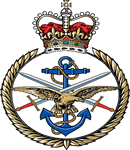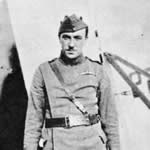Commemorated: | |||
| 1. Memorial: | Aldershot Military Cemetery | AG. 362. Aldershot | |
| 2. Book: | The (1921) Masonic Roll of Honour 1914-1918 | Pg.123 | |
| 3. Memorial: | The (1940) Scroll - WW1 Roll of Honour | 25D GQS | |
Awards & Titles: | |||
Family :
Brother-in-law of Mr. W. G. Scandrett, of 22, Duke's Avenue, Chiswick, London. An extensive biography exists for Frank on Wikipedia, where a copy of his portrait image is also recorded.Education & Career :
An apprentice at Hendon in 1913-14
Service Life:
Campaigns:
- The First World War 1914-1918, World-wide.
| Unit / Ship / Est.: Royal Aircraft Factory |
| Action : Accident |
Accidents were a minor factor in the casualty list. Our definition is deaths resulting from activities that were not directly associated with 'active service'. We have excluded Naval Accidents which are seperately identified because of their numbers and impact. Many accidents involved the aviators, operating at the the limits of technology.
Detail :
David Barnes: "Major Frank Widdenham GOODEN was flying a SE 5 A4562 (the second prototype, modified to production standard) when when the port wings folded up at 1500 feet and the aeroplane crashed at Farnborough on 28 January 1917. It was determined that, due to a design problem, the inter-wing struts were not anchored in a way to enable them to withstand the torsion of flight. The SE 5 [and SE 5a] design was updated following this incident. In 1910 Frank GOODEN was the co-pilot on the first flight to carry a passenger from Britain to France. The flight took place in a Willows III. 35 hp JAP Gas Airship with boom Volume 906 m3. It departed from Wormwood Scrubs London at 15.25hrs on 11/4/1910 and arrived at Douai at 02.00hrs the following day; a transit time of 10.5 hours for 155 miles. Sources: The father of British Airships. Battlebags Updated 1998-08-31 "
Flight Global of 8th February 1917 - "F. W. GOODDEN.
ON February 1st the mortal remains of the late Major Frank Goodden, R.F.C., were laid to rest in the military cemetery at Aldershot, amid every token of sorrow and respect. Full military honours were accorded, and the high esteem in which he was held was plainly evidenced by the enormous attendance. Military funerals have no novelty for the inhabitants of Aldershot and the surrounding district, but Major Goodden had been known for so long to everyone as a most gallant and fearless aviator, and had become personally so -popular, that there was a widespread desire, which even the inclement weather could not check, to pay the last homage to his memory.
The tragic circumstances in which he had met his death—making a test flight on a new machine before officially handing it over to the flying officer who had been sent to take it overseas, and who, by a strange whim of fate, chanced to be one of Frank Goodden's oldest friends and colleagues; his magnificent but unavailing fight for life in mid-air, never to be forgotten by those who had the misfortune to witness it ; and, lastly, the amazing and scandalous attack onhis good name which had been published in a certain quarter on the very day of his burial, all combined to make it one of the most largely attended and most striking funerals in the history of aviation.
The military church was filled with mourners, a notable feature being the attendance of many scores of officers of high rank from the War .Office, Adastral House, the Royal Aircraft Factory, representatives from numerous aerodromes, public bodies and leading *" firms in the aircraft industry. The funeral procession, which was more than half a mile in length, was headed by the band of the Hampshire Aircraft Park. The coffin, draped in a Union Jack and covered with many beautiful wreaths, was borne on a gun-carriage and attended by, amongst others :—
Major-General Ellison, with officers from the Aidershot Command ; Col. Carnegie, M.P.; Lieut.-Col. O'Gorman, representing the Aeronautical Society (of which Major Frank Goodden was an Associate Fellow) ; Mr. Henry Fowler, Superintendent of the Royal Aircraft Factory; Lieut.-Col. Heckstall-Smith; Major Walker-Leigh ; Major Turner, and all Officers of the Hampshire Aircraft Park ; Lieut.-Col. Huggins, D.S.O., Officer Commanding and twelve Officers from the Southern Aircraft Depot; Lieut.-Col. Beor; Capts. Egerton, Ellerton, R. W. Thomas, Mansell, Green, W. H. Ewen; Lieuts. Mond, Skeats, Booth, &c. General Sir A. Hunter was also officially represented.
The four pall-bearers were Lieut.-Col. HeckstallSmith, Major Turner, Major Douglas and Major Walker-Leigh, and the firing party was drawn from the R.F.C. Every parade-ground within sight of the road which winds among the Hampshire hills and commons from the church to Thornhill Cemetery had its regiments drawn up, standing reverently and motionless in the drifting snow, as the procession moved slowly onwards to the haunting melodies of Chopin's " Marche Funebre."
Passing reference has already been made to an attack on Major Goodden which had been published that day In a contemporary journal. It caused a most painful sensation, and was widely and bitterly discussed, both before and after the sad ceremony. To vilify an officer after his death, when he cannot defend himself, is an unheard of crime. To add wilfully and deliberately to the distress of his parents and other relatives on such an occasion was a brutal and unforgivable thing. Small wonder, therefore, that it aroused a perfect storm of furious indignation among all who knew Frank Goodden—and, indeed, among many who had never met him, but who were sickened and disgusted that any human being, on whatsoever pretext, should accuse him of insincerity, indifference to the safety of his brother officers in the Royal Flying Corps, and lack of patriotism.
Frank Goodden joined the staff of the. Royal Aircraft Factory as a civilian test pilot on August 7th, 1914—that is to say, immediately after the declaration of war, and in the following February he received a commission as Second Lieutenant in the R.F.C., still remaining attached to the R.A.F. At first he was engaged upon experimental and research flying, and also upon the testing of aeroplanes built by contractors. Gradually, however, the latter portion of the work was taken over by the Aeronautical Inspection Department, and his duties at the R.A.F. became almost entirely experimental. He flew the first stable B.E. 2C, built after the death of Mr. E. T. Busk, and in January, 1916, he was appointed head of the Experimental Flying Department at Farnborough. His wide experience, his practical knowledge, and his absolute fearlessness made him a most valuable pilot, and the development of the work at the R.A.F. was greatly advanced by his energy and enthusiasm. He was keenly interested in all experiments, and constantly undertook, on his own initiative, work which probably few pilots would care to contemplate.
Among many other subjects which specially interested him may be quoted that of the spinning stability of aeroplanes. Upon such a question most people would be content to theorise, but Frank Goodden devoted much time to the practical investigation of the causes of spinning and the best methods of recovery. In this and countless other directions he worked" tirelessly, and with ever-increasing keenness down to the day of his death.
He was promoted to Squadron Commander, with the rank of Major, in October, 1916, and only those who have been in personal contact with him know how efficient and popular an officer he was. No others have any right to speak of him. To suggest, as has actually been done,'{hat he was imbued with no higher motive than to please those who were in a position to promote his personal welfare, at the cost of the lives of his friends and brother officers, is an infamous journalistic outrage, fortunately without parallel. It is most painful to have to refer to so distasteful a topic, and it has not hitherto been our practice to concern ourselves with the policy of our contemporary, but Frank Goodden is not here to defend himself, and it is a duty to protest against this cruel and cowardly libel on his memory, What those who know thought of it was unmistakably shown at the funeral ceremony.
He was a brave officer and a gentleman, and he died a brave and honourable death in the service of his country.
- In connection with the journalistic article referred ; to above we have received many letters and communications from personal friends of the late Major Goodden and from many others who had no personal acquaintance with the deceased officer. One and all are couched in language of strong protest and disgust: at the unprecedented attack. The feeling aroused by this incident is without doubt very widespread."
See also: Flight Global
Masonic :
| Type | Lodge Name and No. | Province/District : |
|---|---|---|
| Mother : | Alexandra Palace No. 1541 E.C. | London |
Initiated | Passed | Raised |
25th November 1916 | 27th January 1916 | 30th November -0001 |
Source :
The project globally acknowledges the following as sources of information for research across the whole database:
- The Commonwealth War Graves Commission
- The (UK) National Archives
- Ancestry.co.uk - Genealogy, Family Trees & Family History online
- ugle.org.uk - The records of the United Grand Lodge of England including the Library and Museum of Freemasonry
Additional Source:
- Founder Researchers : Paul Masters & Mike McCarthy
- Researcher : Bruce Littley

